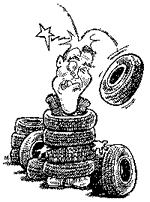| |
 Jim Grant's Tech Tips
Jim Grant's Tech Tips
92
Chevy Corsica, Overheating Problems
Q: I have a '92 Chevy Corsica (6 cylinder, 3.1) that runs "hot". The
idiot light comes on and it runs about 1/8 inch from the red zone at speeds
higher than 65 mph (and often runs hot during in-town driving). I have
had it tested and the head gasket is fine. I have put in a new radiator,
water pump, thermostat, and block thermostat. I have had two separate
mechanics look at it and cannot find the problem. It has never overheated.
The fan and fan relay have not been replaced, but one mechanic said they
are activated appropriately when it hits a certain temperature. The upper
hose blew so I had it replaced, and now it seems to run even hotter. It
does run a little less hot when I run the air conditioner, but with winter
coming up, that won't be an option. Any ideas?
A: Check
the coolant temperature with a scan tool via the vehicle’s computer. The
temperature sensor for the computer is a very accurate sensor. Drive the
vehicle under the condition that the temperature gauge reads the highest
and the warning light is coming on. See if the information seen on the
scan tool confirms that the vehicle is, in fact, running hot. If the vehicle
is running hot and the repairs you stated have been performed correctly
then it is likely there is an engine problem. A bad head gasket or cracked
cylinder head doesn’t always present itself in a fashion that is easily
diagnosed. From time to time a vehicle will elude standard diagnostic
procedures, which requires a more aggressive approach. With one such vehicle
in our shop the engine was run up to operating temperature and then shut
off and the cooling system was pressurized. The pressure for test was
performed at nearly double the normal testing standard. This regulated
pressure was left on the engine for over 24 hours. The next day the answer
was found when the spark plugs were removed and the engine was cranked
over. A small amount of coolant exited a cylinder. There was a crack in
the cylinder head of the engine. You may have to just push the limits
to find the answer to your overheating problem.
|
|



